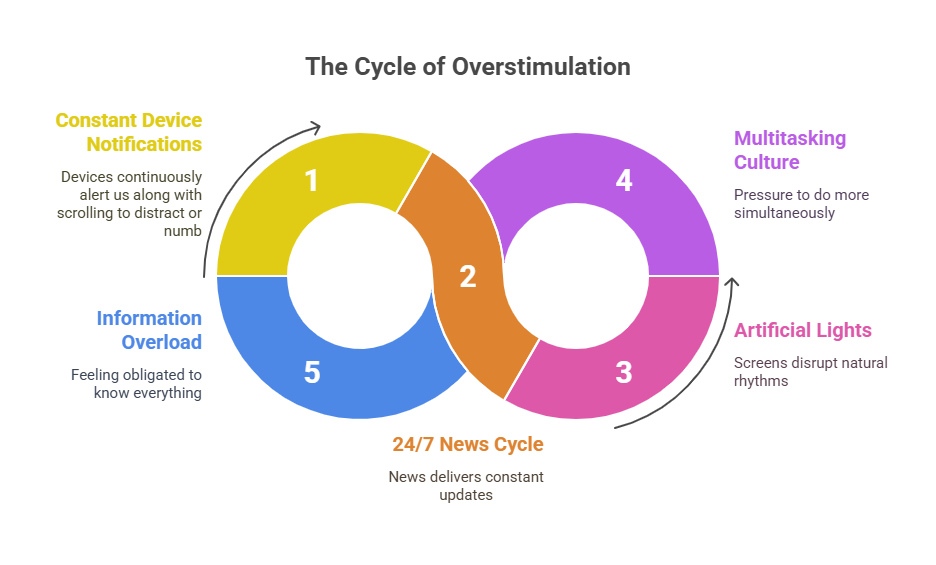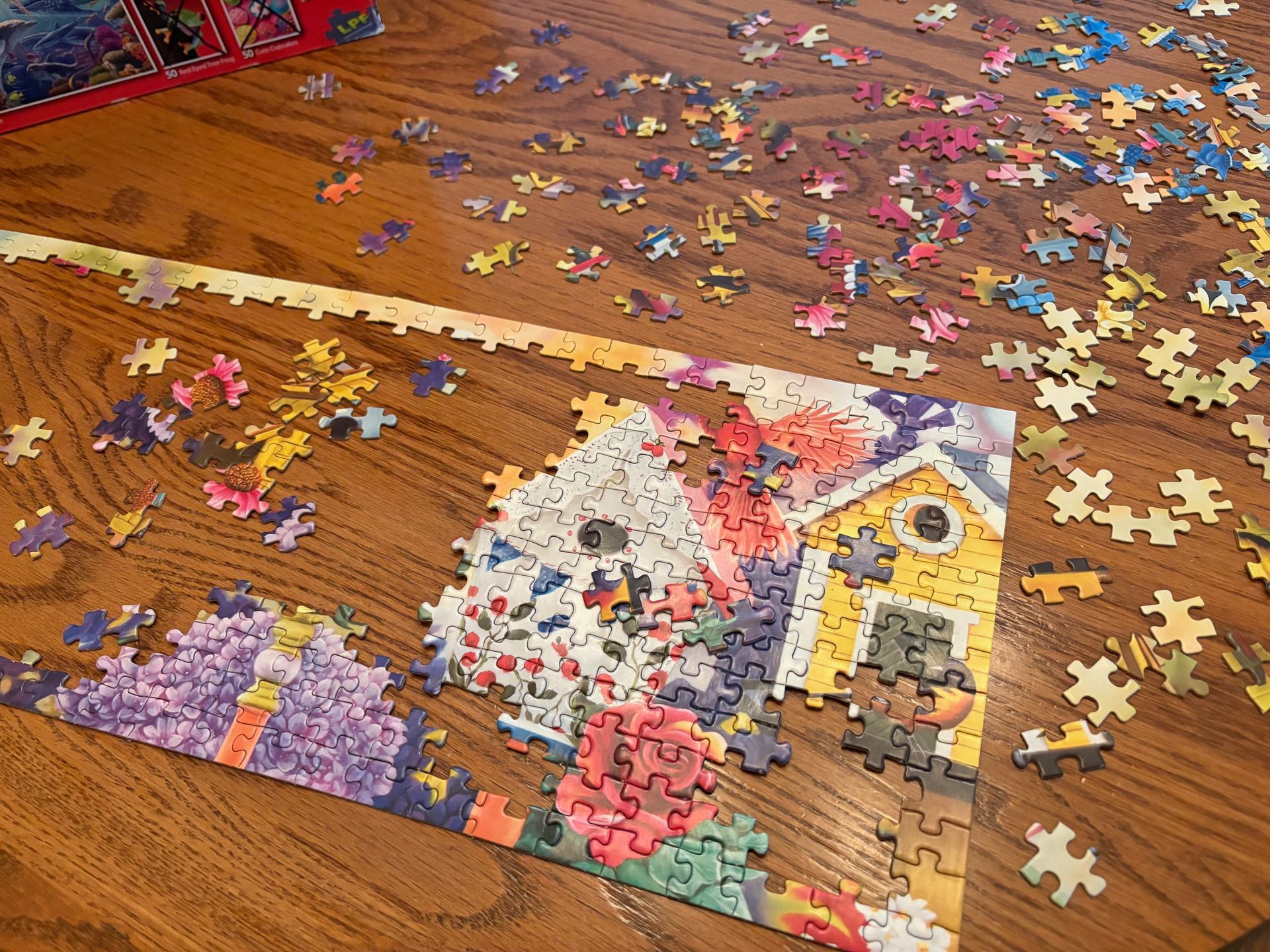Overstimulated
Why You Feel So Exhausted
I live very near two sets of train tracks. Without the train tracks, my backyard would be idyllic. Flowering trees. Squirrels that play and birds that sing. Quiet neighbors. A golf course beyond my yard.
But where there are tracks, there are usually trains. And in my case, LOTS of trains. With very loud whistles. Day and night. When I first moved to my home, the trains came through about every 20 minutes. Now it is about every 45 minutes.
Sometimes the trains are so heavy, my windows vibrate. Sometimes the whistles are so loud, I plug my ears until they are past. Depending on the moisture in the air and the direction of the wind, they can be deafening at times
My brain has become so acclimated to noise and stimulation during the day that I don’t notice them as much as I used to. But when all is still and quiet at night, the train vibration and whistle are jarring to my brain and can bring me out of a dead sleep quite quickly.
But here is one thing I’ve noticed. Day or night, if I am overwhelmed by other stimulation, the trains are louder and more annoying. They interrupt my thoughts or sleep and leave me feeling irritable.
Now, you might not deal with trains like I do. Maybe a distant train whistle lulls you right to sleep, but I’m sure you deal with the overwhelm from overstimulation.
If you’ve ever wondered why you feel so tired, irritable, or emotionally fragile—despite doing "all the right things"—you’re not alone. I see it regularly in the women I work with: women who love their families and want to serve the Lord with joy… but sometimes feel stuck in a fog of fatigue, anxiety, and overwhelm.
Let me share something that might give you clarity—and hope.
We Weren’t Designed for This Much Input
Today’s world bombards us with stimulation. Phones ping. Emails demand responses. Social media scrolls never end. Even when we’re “resting,” our nervous systems are still absorbing a steady stream of noise, light, and pressure to be "on." We’re living in a world that assaults the senses and overstimulates our brains without giving our bodies a break to reset.
Consider just a few ways our daily lives keep us activated:
- Constant dings, beeps, and buzzing from our devices
- 24/7 news cycles that deliver fear from around the globe
- Screens and artificial lights that override our God-given circadian rhythms
- A culture of multitasking that insists we hustle harder
- Endless access to information that we feel obligated to understand, even if we can’t control it

This is not the pace of life our bodies -- or our souls -- were created for.
What’s Really Happening in Your Body
When we are surrounded by unpredictable, uncontrollable, and novel input (as the book Widen the Window puts it), our nervous systems go on high alert. It’s not that we’re weak—it’s that we’re wired to mobilize when there’s a perceived threat. The problem? In today’s culture, the “threats” never end. Even though most aren’t life-threatening, they keep our bodies revved up in stress mode.
The result? Chronic dysregulation of the nervous system. That’s why so many women experience:
- Poor sleep
- Blood sugar imbalances
- Mood swings
- Chronic fatigue
- Brain fog and difficulty focusing
A Look Back: Life 100 Years Ago
Contrast that with life in the 1920s:
- People rose and slept with the sun.
- News came once a day, not minute-by-minute.
- Work included natural movement—walking, gardening, chores.
- Technology didn’t follow them home.
- Life had built-in pauses, like Sunday rest and family dinners.
There was stimulation, yes—but also recovery. Today, we’re missing that rhythm of
rest and reset.
So, What Can We Do?
God created our bodies to recover. But we must be intentional about stepping out of the chaos and into His design. Here are a few gentle, foundational steps:
1. Reduce Stimulants
- Limit or eliminate caffeine, sugar, and alcohol, which all disrupt our natural rhythms.
- Try calming alternatives: herbal teas, green tea (in moderation), or caffeine-free blends like Dandy Blend or Teeccino.
2. Balance Your Blood Sugar
- Include more protein throughout the day to steady your energy and mood.
- Avoid sugar, especially in the evening. A small protein-rich snack before bed can help you sleep more soundly.
3. Honor God’s Rhythms for Rest
- Stick to a consistent bedtime to reinforce your circadian pattern.
- Avoid screens, intense conversations, and high-stimuli environments in the evening.
- Practice deep breathing, progressive muscle relaxation, or prayerful stillness before bed.
4. Move Your Body—Gently
- Light, intuitive movement can work wonders for stress and energy. Just 20 minutes of light exercise 3 times a week reduced fatigue by 65% according to a study by the University of Georga.
- Don’t force a workout. Instead, ask: “What kind of movement feels nourishing today?”
5. Know What Overstimulates You
We’re all wired a little differently. Take time to notice what pushes you into sensory overload. For me, even though trains are on the list, my phone moves me toward sensory overload even more quickly.
Then gently introduce soothing practices:
- Soothing worship or instrumental music
- Essential oils (lavender, wild orange, cedarwood)
- Walks in nature
- Technology fasts (even 1 day a week makes a difference)
- Time in silence and solitude
- Somatic practices (body awareness, breathwork, gentle stretching)
- Follow the diurnal rhythm: rise with the sun, wind down at dusk
You Were Made for Peace
We often carry the weight of our families, ministries, and communities. But God never asked us to live from a place of chaos. He invites us to rhythms of grace—“Come to Me, all who are weary and burdened, and I will give you rest.” (Matthew 11:28)
If your body and mind feel overstimulated and hijacked by the world, know this: you are not broken. You are simply living in a world that doesn’t honor God’s design for your body. But you can return to rhythms that restore your nervous system—and your soul.











